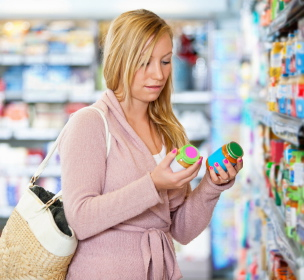
“Which of these products will absolve me of more civic engagement?”
Food is inherently personal. But is that all it is?
Let’s take a moment to look at the comments on a recent Facebook post from NPR about the tie between antibiotics in factory farmed chicken and bladder infections.
First up, the ever-popular: “Oh no! That sucks … Oh wait, I’m a vegan.”
Then: “Just don’t eat chicken,” “So now I gotta raise my own chickens[?],” and, “GROSS. So glad I’m back to vegetarianism and mostly shopping the farmers market and local co-op. The whole mainstream food system is so completely disgusting.”
Here’s another similar example. Last month, I wrote a post about a campaign by the Consumer’s Union to convince several major grocery chains to stop carrying meat from animals raised with antibiotics, and one commenter said, “GO VEGAN.”
These comments make perfect sense. If you want to see less support for factory farms, I think going vegan can be a great choice (this is not an anti-vegan rant). But it doesn’t really matter what the post is about. There will generally always be someone, if not many people, there to tell us that this or that huge systematic problem shouldn’t bother, let alone interest, them because they’ve already taken their “five easy steps” to fix it on a personal level. And more often than not, I find that people’s gut responses to stories that fall into the “food politics” category fail to reflect the fact that food is both personal and the product of industry, public policy, and a whole host of systems that we have the opportunity to look critically at (and, in doing so — ideally — change).
For a very long time our food system was essentially opaque, so individual choice was all most of us had. And I certainly understand that not everyone will care about the amazing array of tools for connecting the dots from personal to systemic change. But I’d argue that if we practice the former without the latter, sooner or later we’ll end up in a safe but limiting cul-de-sac where very little actually happens.
And it’s not that this focus on individual responsibility only comes up in relation to food. In fact, the newly released National Geographic’s Greendex 2012 [PDF], which rates consumer attitudes in 17 nations, points to this trend across the board. According to the Greendex, Americans “are near the top of the range when it comes to believing their individual choices could make a difference (47 percent).”
As we reported last week, the Greendex also found that we are the worst at making sustainable consumer choices and we have the least guilt about it. So I find it fascinating that Americans also believe we can make a difference … just as soon as we feel like trying.
And when we do try, we may just have a teeny tiny tendency to allow the gospel of personal choice — and our own cloth-bag-carrying, antibiotic-free lives — to block out a little too much of the sun.
Don’t get me wrong; I have voted with my fork for the last half-decade (although I have to press extra hard to get it to leave much of a mark on the ballot). And I love hearing people’s tips, recipes, and strategies for avoiding the slime/glue/corn byproducts that are so cheap and easily available to most of us. (Here’s a recent favorite from a friend who brings her rice cooker on the road and makes impressive meals in hotel rooms!) But let’s pat ourselves on the back and then move on to see what else we can do.
And please, if we’re talking about, say, the consolidation of the milk industry (because yes, if you know me, that does happen), please don’t turn to me and say, “I don’t drink milk,” as if it’s going to put an end to our conversation.
What’s that? Shell Oil has moved one step closer to drilling in the Arctic? Oh, didn’t I tell you? I don’t drive.



